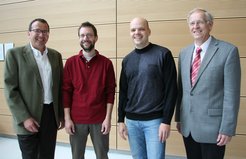Of Droplets and Turbulence
In this year, the European Research Council has awarded two Starting Grants to scientists from the Max Planck Institute for Dynamics and Self-Organization.

Turbulent flows are almost omnipresent in our everyday life, for example when water flows through water pipes, when tea is poured into a cup or when a moving car stirs up the air in its immediate surroundings. Nevertheless, the physical laws governing such flows are still poorly understood. „I am especially interested in the transition from a calm flow to turbulence“, Hof describes his approach. Understanding this transition would allow completely new insights into the phenomenon of turbulence. Apart from questions dealing with structures and energetic mechanisms driving turbulent swirls, another one of Hof's goals is to develop methods to end turbulences in a well-directed manner. This would make it possible to significantly reduce friction losses in transport processes, for example in oil pipelines.
Flows at smaller scales are the focus of microfluidics, Baret's field of research. Here, tiny droplets flow through channels with diameters of only a few micrometers, where they can be sorted, merged, and analyzed. In the next five years, Baret and his team want to study how such droplets can be used as microscopical test tubes. The team's goal is to insert biological cells or genes into the drops, allow them to react or interact with surfaces and then read-out the results of the reaction. „Since these reactions would ideally take place in many thousand drops, it is impossible to manipulate each miniature test tube seperately“, says Baret. „Instead, we want to understand, how the drops organize themselves to provide novel functions for the microreactors“, he adds. In this way, we can use this behavior to our own advantage.
„The ERC Starting Grants not only offer young researchers financial independence to carry out ambitious research projects“, says Prof. Dr. Eberhard Bodenschatz, Managing Director of the MPIDS. Since the founding of the ERC five years ago, the Starting Grants have also become internationally known to distinguish excellent and especially promising projects. „Therefore, we are very proud, that the ERC has now recognized two of our young scientists in this way“, he adds.
In this year, the ERC awarded its Starting Grants for the fifth time. From 4741 applications only 536 projects were chosen. Over the next five years, the researchers will recieve funding of up to two million Euros. The selection commitee not only bases its decisions on the excellence of the proposed projects. The committee looks for researchers who were also able to establish themselves as independent and well-recognized scientists within the first years after recieving their PhD. „The Max Planck Research Groups offer young scientist ideal conditions to live up to this criterion“, says Bodenschatz.
Dr. Jean-Christophe Baret has been heading the Max Planck Research Group „Droplets, Interfaces, and Membranes“ at the MPIDS since 2010. Since 2007 Dr. Björn Hof has been the lead scientist of the Max Planck Research Group „Complex Dynamics and Turbulence“.
